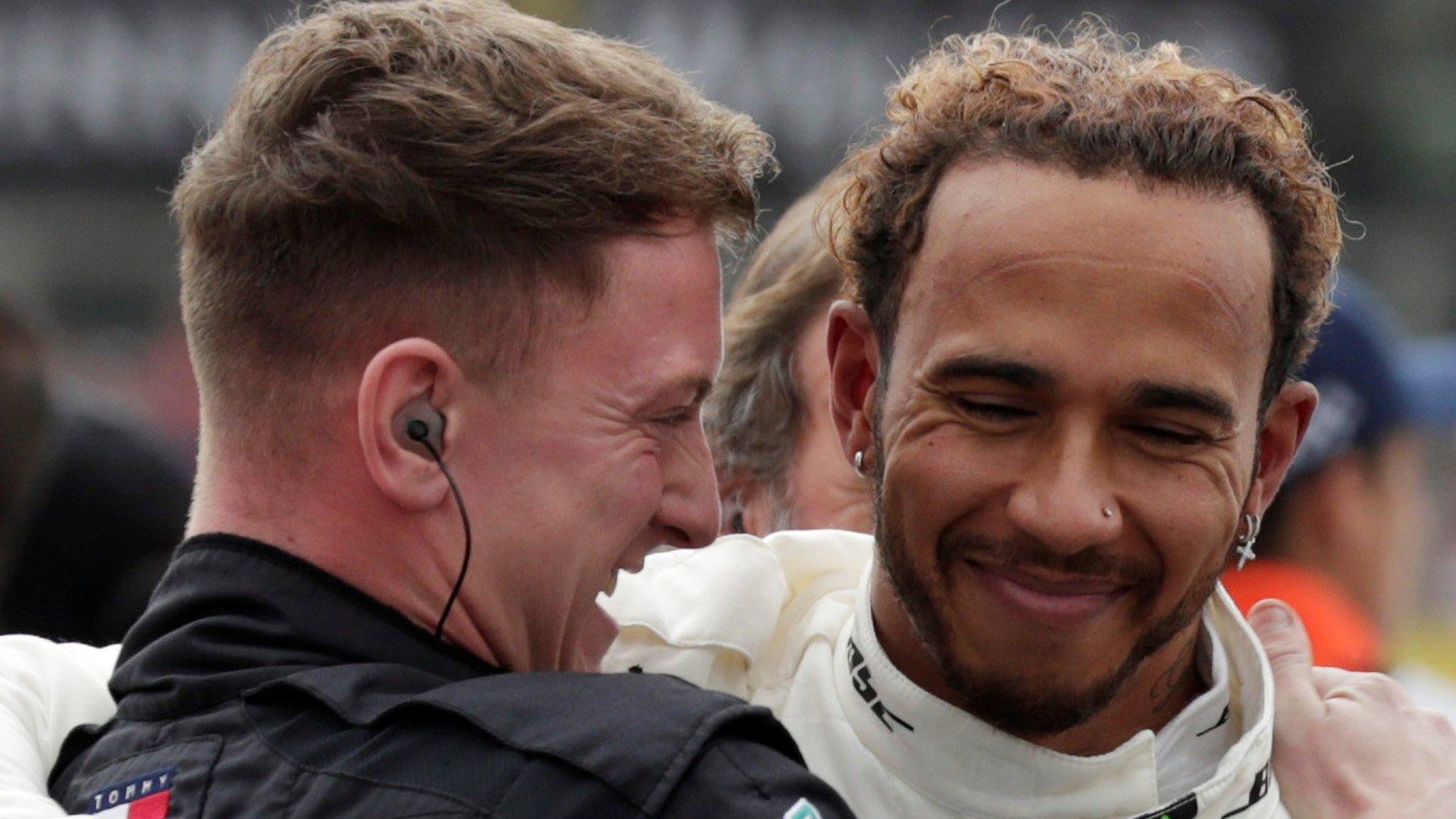Lewis Hamilton on 2018 F1 world title: 'Let's dance. I know how to get by you'
- Published
- comments
F1 Breakdown: 'Hamilton just has the best car, doesn't he?'
Lewis Hamilton's successful quest for a fifth world title, I suggest to him, can be distilled down to one simple phrase: Ferrari dropped the ball and he knocked it out of the park.
Hamilton chuckles a little at the suggestion, and then says: "The description is not too bad."
"It's been an incredible season - mentally and physically, for everyone in the team," he adds, as he reflects on the ups and downs of what will surely come to be remembered as his finest achievement yet - winning the title against four-time champion Sebastian Vettel in a car that was, for at least half the races, faster than his own.
"On the drivers' side," Hamilton says, "the mental side has been the key. Ferrari were so strong at certain points of the year - particularly in the first half of the season - we didn't know how it was going to end.
"But the best parts of the season have been when we've been on the back foot and it's not looked great - but we managed to claw our way back and collectively do a better job overall [than] their team and their driver.
"That's really what's made the difference this year, which is something the whole team can be really proud of."
Hamilton is in expansive and revelatory form as we discuss the year and cover among other topics:
where his stand-out performances come from
the psychology of the battle with Vettel
his spirituality and how it impacts his racing
his growth as a sportsman since his electrifying debut in 2007
an insightful anecdote from inside a drivers' briefing
A battle of minds as well as talent
This year started as a contest between Hamilton and Vettel to see who would become the first man of his generation to win a fifth world title.
For much of the year, it was impossible to predict how it was going to end. The Ferrari has been a faster car than the Mercedes at least as often as it has been the other way around but at key moments Hamilton has excelled and Vettel and/or Ferrari have messed up.
Hamilton sees the three defining moments of the season as:
The German Grand Prix, when Vettel crashed out of the lead as Hamilton closed in rapidly in a late-race rain shower and the Mercedes driver went on to win
The Italian Grand Prix, when Ferrari's failure to impose team orders on their front-row starting drivers allowed Hamilton to pass Vettel on the first lap, and take a brilliant victory chasing down the German's team-mate Kimi Raikkonen
Singapore, where a lap for the ages from Hamilton put him on pole on a track where Mercedes have traditionally struggled
Hamilton believes Monza was "probably the biggest psychological blow" for Ferrari, to lose after they had locked out the front row.
But he adds: "They'd had a couple - Seb's psychologically difficult time when he made a personal mistake [in Germany]. As a driver, when the team makes a mistake, it's painful. But when it's you, when it's in your control, that's a horrible feeling. He would have taken that to heart.
"Then we had that fight at Monza. That would have been a team blow for them. But we didn't get complacent after that great result for us. We knew we still had to execute, going to places like Singapore where Ferrari usually destroy us. And what a weekend it was.
"None of us predicted that we would've won in Hockenheim or Monza or particularly Singapore. Collectively we've done an amazing job in this team."
Those 'Lewis Hamilton moments'
The championship should have been close to the end, so evenly matched have Mercedes and Ferrari been.
That it was not is partly down to the errors that have defined Vettel's season and at least as much to the remarkable performances Hamilton has produced, often when on the back foot.
His pole lap at Silverstone when Ferrari seemed to have the faster car; the race in Germany when he took seconds a lap out of Vettel's lead in the rain before his rival crashed; winning in Hungary when the Ferrari was much quicker; his exquisite demonstration of all the qualities that define a world-class driver in Monza; and that unbelievable qualifying lap in Singapore.
Hamilton has always produced moments like this, but he agrees there have been more of them this year.
"Definitely," he says. "What you don't get to see is I have this large group of people to utilise. They're my tools, my soldiers, whatever you want to call them.
Pot washing & for sale signs: How Hamilton conquered F1 as only working-class driver
"We all individually think we're operating at the highest but one of us can lean against another and pull more out of them.
"My job is to try to extract the most from every single person there. So, how you debrief, how you understand personally, how you engage with everyone when you have a bad weekend, how you lift everyone up. How you nurture that and build upon it has been key this year.
"If I didn't get those guys in the right positions, I wouldn't be able to extract what I have in me. I have always had what I have in the way I am driving but if they mess up or slip or didn't do something right, I can't unlock the potential in the car, and that's why it's a collective group."
Once out on his own in the car, he says: "It's all about seizing the moment. When it rains in Budapest, for example, I would imagine it is easy to look at it and think, 'Shoot, that makes it much harder for us all.' That is looking at the glass half-empty. I look at it the other way, like 'This is an opportunity for me. Great. They were actually quicker in the dry. Now I know I can make the difference in the wet if I put it together.'
"Now, knowing it initially and actually doing it is two different things. Then I go into the zone of how am I going to put this lap together to make sure I'm ahead."
It's a head space you get into?
"I think it's a head space, yeah."
Whatever it is, it has led to moments in which he has excelled himself. In Germany, he closed dramatically on Vettel as rain began to fall late in the race - and the Ferrari driver ended up crashing out, causing a 32-point swing in the championship.
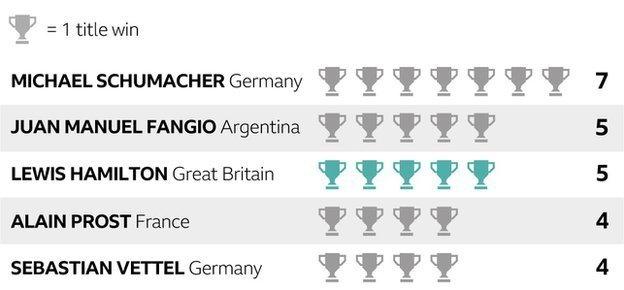
"I didn't know it was going to rain," Hamilton says, "so you are progressing mentally in the race. But then when it started to rain, I'm like: 'OK, I'm gonna catch him.' And I also know that he's thinking I'm gonna catch him. I'm sure they're telling him where I am."
The day had started with Hamilton in 15th on the grid because of a hydraulics failure in qualifying - a disappointment he likens to missing out on pole at the 2014 British Grand Prix after erroneously bailing on his final lap in changeable conditions.
"The night before, recovering from the loss… a bit like at Silverstone in '15 when Nico [Rosberg] got pole. I was distraught but came back the next day and won.
"In that race [Germany], qualifying I was out, he was on pole. 'How do I minimise the loss?' It's how you recover from those. That psychological operation for me is the most powerful."
A sense of the otherworldly
Hamilton is religious; he has said he prays every day.
After the race in Germany he made a number of remarks that hinted at his faith. "My prayers were really answered," he said at the time. "It freaks me out a little bit more than normal."
Three months on, he reflects on what he meant.
"I don't pray to win," he says. "I don't pray for fortune. I always just ask - whether you're talking to yourself or someone's hearing you - but 'I want to be able to live to my potential today. Allow me to live to my potential today. I know I can be great but certain things get in the way and you're not always able to be great. Just allow me to run free.'"
Boos from the partisan crowd also played their part.
"Also in Hockenheim there was so much negativity. For me, that's like the devil. Let me shine on this and turn that darkness - that booing, which is all dark.
"For me, the sun was shining even though it was raining."
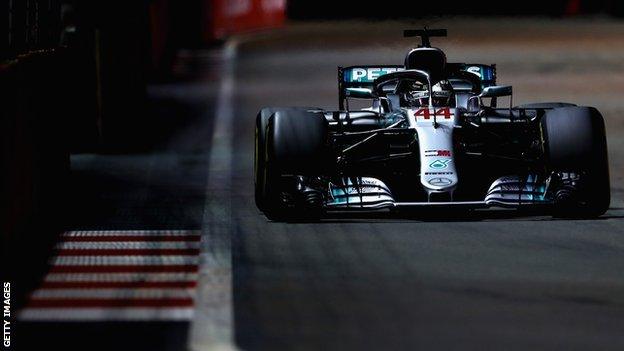
Hamilton produced one of the best laps of his career to take pole in Singapore
After the race, there was a torrential downpour.
"For me that felt biblical," he says, "if you knew the stuff that I'd said in my prayer - and it was not predictable. Those things I had asked to work against. I didn't ask for the rain at the end of the race. That was almost like… if you ever asked for a sign of something, that was a sign."
Then there was his Instagram description of his qualifying lap in Singapore as "heaven-sent".
He explains: "I'm not saying that's controlled from above or anything. When I say it's heaven-sent, it's just you're always searching for perfection. You never get close to it. But that was the closest I felt. The lap just went. It was awesome. For me, that was one of the best laps I've ever done."
Only "one of the best"? Why not "the best"?
"Because I've got a really bad memory and can't remember all my pole laps. I don't want to be absolute about it and then remember, 'Oh yeah there was another lap.'
"But from what I currently have stored in my mind, yeah, it was the best.
"But when I say it's heaven-sent, it's just about setting yourself goals and that feeling you have. Think of heaven - heaven's a perfect place and on that lap I felt I was in a perfect place. In a beautiful place, an amazing feeling, balanced and at my best."
The psychology of battle
Not only has Hamilton won the battle with Vettel over a year, he has, at crucial moments, beaten him in a straight fight on track, too.
Vettel passed Hamilton easily on the straight to win the Belgian Grand Prix, but Hamilton's moves on his rival on the first lap in Italy, and after losing a place at the pit stops in Russia, were more defining.
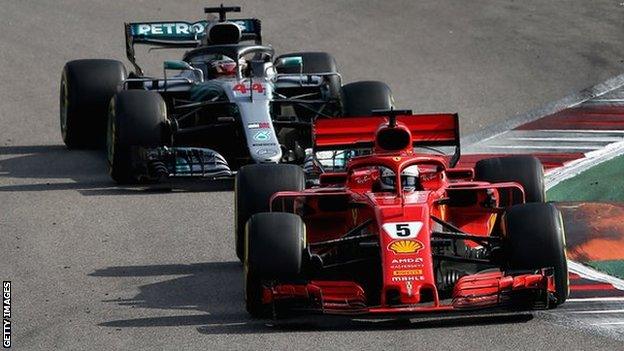
Hamilton has been involved in several battles with Vettel throughout the season
The impression is that Hamilton knows he can pass Vettel when he needs to, and it's not one he tries to diminish.
"I never ever think: 'I own you,'" he says. "I don't use that mentality. But if you imagine, erm, look at [Floyd] Mayweather as he goes into the ring. I don't think I've ever seen him not look like he knows he's going to win. Even if the opponent is taller or whatever.
"It's the same when I look at different athletes and I'm wondering what's the difference between them and how they are not nervous because they know what the other person may or may not do.
"But when I came out behind, I know where his strengths are, I know where his weaknesses are and I know where I'm better. So it's game on. I'm like, 'Let's dance. You might get the better of me [in] this bit but I know how to get by you."
Behind the scenes with the drivers
Although Hamilton won the battle with Vettel in Russia, he was not happy with the Ferrari man's driving, feeling he had made an illegal second move when defending before Hamilton passed two corners later.
Hamilton brought it up in the drivers' briefing with FIA F1 director Charlie Whiting at the next race in Japan. He takes up the story, which includes an amusing pop at Red Bull's Max Verstappen.
"It wasn't really an argument," he says. "It was a different opinion about how you see and interpret the rule book.
"You ask things to Charlie and he says one thing but it means another. Sometimes. So I said, 'Charlie, are you allowed two moves under braking? Is it one move or two moves? The rules say one but that was a two-move thing and you look at the footage and in my eyes that's two moves.'"
Hamilton is referring to the moment during the race when Hamilton was closing on Vettel on the straight down towards the de facto first corner. Vettel moves to his right to defend. He stops moving, and then moves again, squeezing Hamilton towards the wall on the inside, and forcing him to brake to back out of the overtake.
Hamilton continues: "Charlie said, 'Yeah but if you look from the front, it looks like he turns and then slows down and then keeps going, so it's still one move.'
"So I'm like, 'OK, in the future, if I move, as long as I keep a bit of angle on the car, it's still one move then I'm going to be fine? But it's actually two.' I'm saying, 'You're setting a precedent.'
"I asked all the drivers, 'What do you think?' And there was only one driver really that looked at it and saw two moves but said it was OK, and that was Max. Because he does two moves!"
Hamilton laughs out loud. "So, I was laughing and saying 'Max, you're the one that started this whole two-move thing. You're the king of the double move.' It's just trying to understand it."
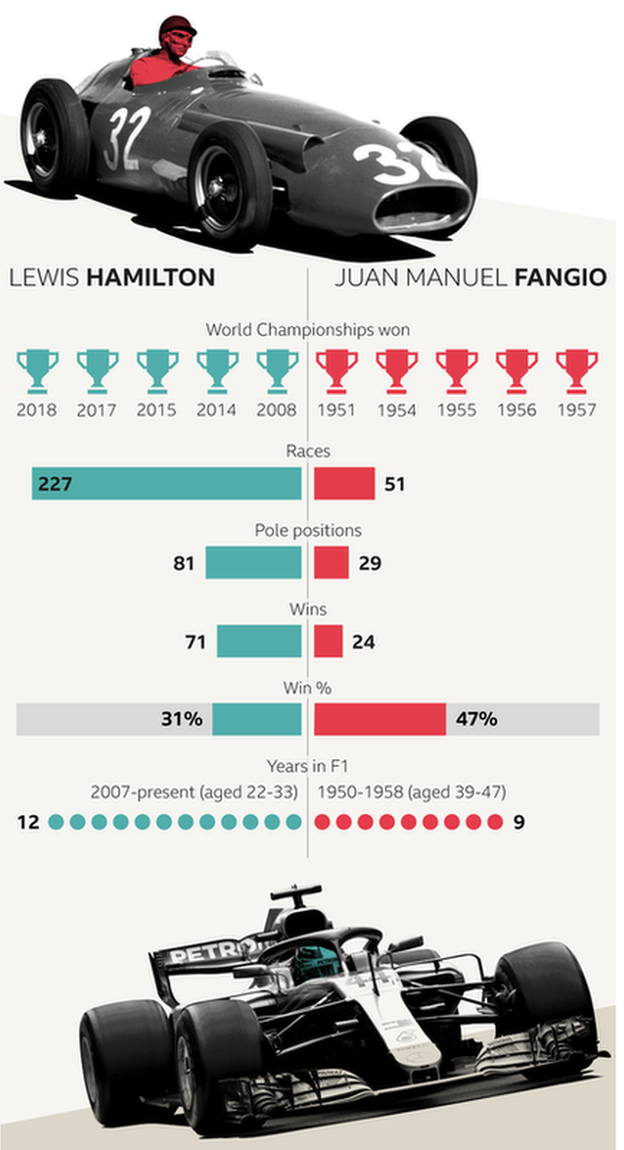
Personal development
It's not been a perfect season and Hamilton admits he has had some bad races. China, early on, he calls "a shocking weekend," for example, adding: "The first half of the season wasn't great."
But, in contrast to Vettel, what has been striking is his lack of errors, which he says has "allowed me to enjoy the highs more". In achieving this, he says, "discipline is very much key, how you study and prepare for the race".
It is in this way, he says, that he has come on from the raw talent who shocked Fernando Alonso in his debut season, when they were McLaren team-mates.
"2007 me wouldn't have a chance [against 2018 Hamilton]," he says. "And he was still very quick."
Hamilton says he feels "people underestimate that season", adding: "Being in a top team straight away and having to try to deliver against a two-time world champion who has been through what I have been through to this point almost, is a huge demand and it was one of the toughest years of my life."
Now, he says, he is on "a much, much different level. Last year, I was trying to figure out this amazing year and how can I improve on that.
"When you have won the championship, it is easy to just ride the wave and think it's great. But I am always wanting to raise the bar."
Five titles and 71 wins and counting. Lewis Hamilton is a long way from finished yet.
- Published29 October 2018
- Published29 October 2018
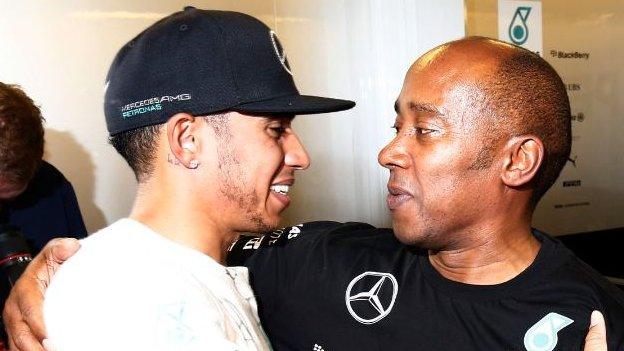
- Published28 October 2018
